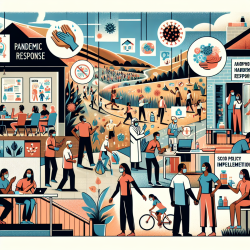Understanding the Impact of Non-Pharmaceutical Interventions (NPIs) on COVID-19 Spread
The COVID-19 pandemic has challenged public health systems worldwide, prompting governments to implement various non-pharmaceutical interventions (NPIs) to mitigate the spread of the virus. A recent study titled Non-pharmaceutical Interventions and COVID-19: Do County- and State-Level Policies Predict the Spread of COVID-19? provides insights into how these interventions have influenced COVID-19 outcomes in the United States during the pandemic's early stages.
Key Findings from the Study
The study utilized county-level COVID-19 data to assess the impact of NPIs such as mask mandates, daycare closures, stay-at-home orders, and restaurant and bar closures. The researchers found that:
- NPIs collectively reduced both total and cumulative deaths and cases. Longer implementation of NPIs was associated with more significant reductions in COVID-19 cases and deaths.
- Counties with higher shares of racial and ethnic minorities experienced differential impacts from NPIs, with some policies being more effective in areas with larger Black populations.
- Despite the effectiveness of NPIs in reducing cases and deaths, they did not significantly "flatten the curve," indicating that while NPIs reduced the number of cases and deaths, they did not prolong the time to peak cases and deaths.
Implications for Practitioners
Practitioners can leverage these findings to improve their pandemic response strategies by:
- Advocating for early and prolonged implementation of NPIs to reduce the severity of future outbreaks.
- Considering the racial and ethnic composition of their communities when designing public health interventions to ensure equitable outcomes.
- Balancing the benefits of NPIs with their economic and social costs to minimize adverse impacts on communities.
Encouraging Further Research
While the study provides valuable insights, it also highlights the need for further research to understand the long-term effects of NPIs and their impact on different demographic groups. Practitioners are encouraged to explore additional data and collaborate with researchers to develop more targeted and effective public health strategies.
Conclusion
The study underscores the importance of NPIs in managing pandemics and offers a foundation for practitioners to refine their approaches to public health crises. By understanding and implementing the lessons learned from this research, practitioners can enhance their preparedness for future outbreaks.
To read the original research paper, please follow this link: Non-pharmaceutical Interventions and COVID-19: Do County- and State-Level Policies Predict the Spread of COVID-19?










